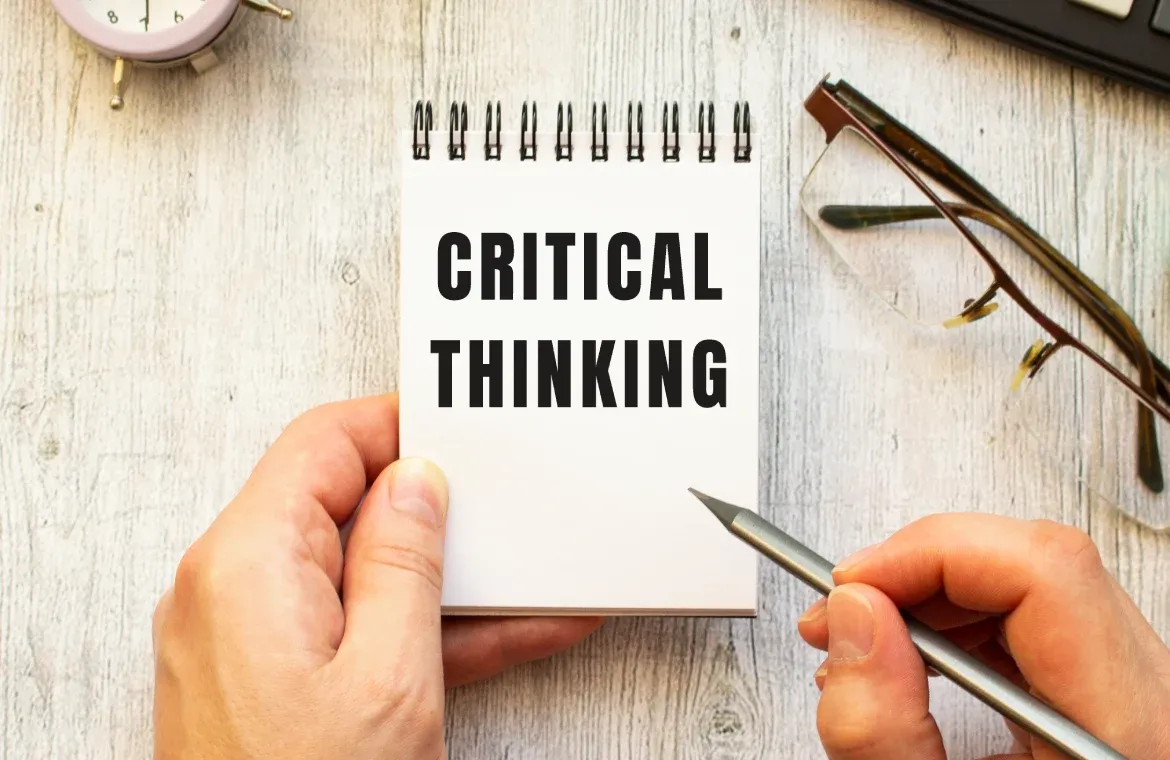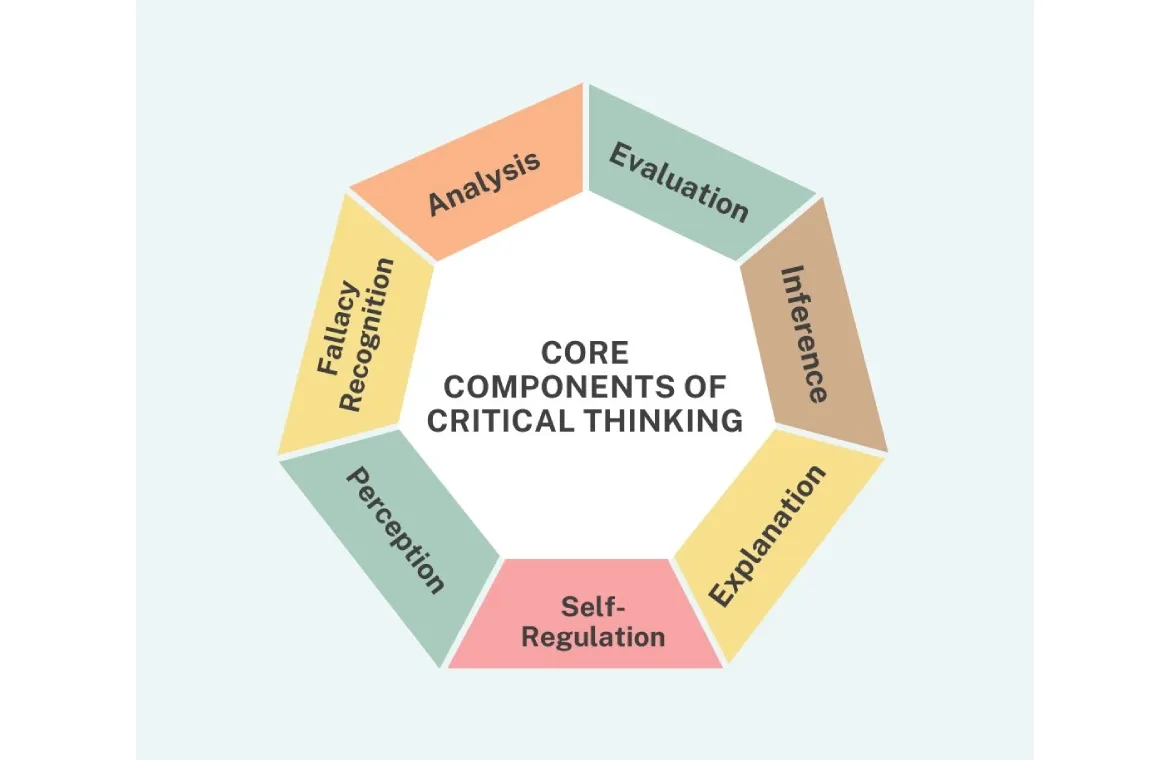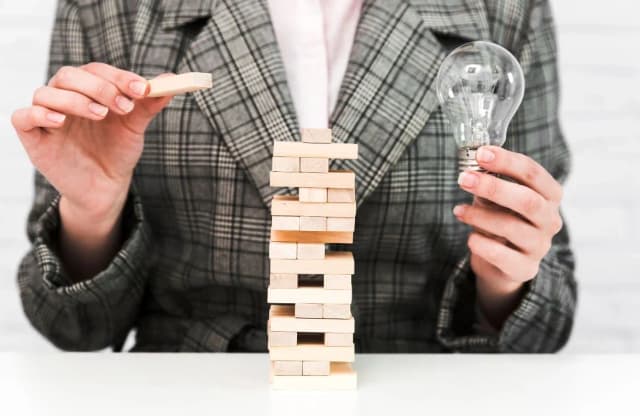What is Critical Thinking?

Critical thinking is not something you do once with an issue and then drop it. It requires that we update our knowledge as new information comes in. - Daniel Levitin
Imagine you're faced with a puzzling situation: Should you trust a news headline you just saw on social media, or should you dig deeper before forming an opinion? Such instances call for one superpower that can make all the difference in school, work, and everyday life: critical thinking.
Critical thinking isn’t just about being smart or memorizing facts. It’s a skill that helps you question, analyse, and make well-informed decisions when faced with a wide range of information, especially in today’s world, which is flooded with data and opinions. Whether you're navigating the digital maze of information online or solving real-world problems, critical thinking guides you to look beyond the surface and find what truly matters.
What is Critical Thinking?
Critical thinking is the skill to carefully interpret, evaluate, and analyze facts and information to form your own well-reasoned judgments about what is right or wrong. It goes beyond simply asking questions; it means thinking clearly and logically to understand issues deeply, challenge assumptions, and make informed decisions.
Key Aspects of Critical Thinking
Analysis and Evaluation: Breaking down information into its component parts to understand its structure and validity, and judging the quality and credibility of sources.
Questioning and Reflection: Proactively asking questions, challenging assumptions, and reflecting on your own thought processes to identify strengths and weaknesses in your thinking.
Reasoning and Logic: Using logical reasoning and evidence to make sense of information and support conclusions, rather than relying on emotion or rhetoric.
Problem Solving: Applying critical thinking skills to analyze problems from multiple angles and develop creative, well-reasoned solutions.
Open-mindedness: Giving fair consideration to different viewpoints and being willing to change your beliefs when presented with new information or evidence.
Importance of Critical Thinking
One of the biggest reasons critical thinking is vital is because it helps us separate fact from opinion. With social media and endless news outlets, not everything we read or hear is accurate.
A critical thinker questions sources, identifies biases, and looks for logical evidence before accepting information as truth. Here’s how critical thinking can impact different situations.
At Workplace
Sharpened Problem-Solving: Critical thinking empowers people to tackle challenges from multiple perspectives, unlocking more effective and sometimes unexpected solutions. When teams pause to analyze an issue thoroughly, like dropping sales or a tricky customer complaint, they’re far more likely to land on innovative fixes that really work.
Confident Decision-Making: Instead of acting on a hunch or guesswork, critical thinkers weigh their options, consider possible outcomes, and base choices on evidence and logic. This ability leads to smarter business moves and fewer regrets.
A Competitive Edge: Employers value critical thinkers because they adapt easily, bring creative ideas to the table, and make strategic contributions. These individuals are ready to thrive in fast-changing workplaces and often rise into leadership roles.
In Personal Life
Better-Informed Opinions: Every day brings a flood of information. Critical thinking helps filter out the noise, spotlight what’s relevant, and form well-supported viewpoints.
Personal Growth: Through honest self-reflection, critical thinkers recognize their own biases and areas for improvement key steps toward real personal development.
Clear Communication: Organized thinking leads to clear, persuasive expression. Critical thinkers articulate their ideas and listen thoughtfully, making them excellent conversationalists and collaborators.
For Society
Greater Independence: Societies flourish when people question, investigate, and make up their own minds rather than accepting claims at face value. Critical thinking nurtures independent, informed citizens.
More Empathy: Analyzing issues from different viewpoints helps individuals build empathy and appreciate others’ experiences a foundation for cooperation and harmony.
A Catalyst for Progress: Critical thinking drives science, innovation, and social advancement. By questioning the status quo and searching for evidence-based answers, it sparks discoveries and positive change.
Core Components of Critical Thinking

Analysis: Analysis breaks down complex information into simple parts, helping you see how elements fit together. This makes it easier to identify hidden assumptions and understand the whole picture.
Evaluation: Evaluation checks if sources and arguments are reliable and relevant. By doing this, you ensure decisions are based on credible, unbiased information.
Inference: Inference helps you draw logical conclusions from analyzed evidence. This ensures that your judgments and solutions are well-supported and valid.
Explanation: Explanation lets you clearly communicate your reasoning and conclusions. Sharing your thought process helps others understand and engage with your ideas.
Self-Regulation: Self-regulation means reflecting on your own thinking to spot and correct biases. Regular self-checks promote fair, accurate, and objective reasoning.
Perception: Perception recognizes how context and biases influence your thinking. Awareness of these factors leads to more accurate interpretation and better judgment.
Fallacy Recognition: Fallacy recognition is the skill to spot logical errors that weaken arguments. Identifying and correcting fallacies makes your reasoning stronger and decisions more rational.
What are Critical Thinking Skills? And How to Build Them
- Spotting Biases: Identifying biases means recognizing any unfair influences or prejudices that might cloud a situation. By pointing out these biases, you can make more objective decisions and see challenges from a fresh perspective.
- Research: Research is all about gathering reliable facts so you’re well-prepared to discuss or present a topic. Using credible sources builds your confidence and ensures you can ask the right questions to deepen your understanding.
- Open-Mindedness: Staying open-minded in discussions or team activities means giving every idea a fair chance before jumping to conclusions. Welcoming different opinions not only helps you find better solutions but also builds positive relationships within the group.
- Interpretation: Interpretation means making sense of data, ideas, or experiences and understanding their meaning. For instance, a doctor interprets test results to explain what they mean for a patient’s health and possible treatment.
- Problem-Solving: Problem-solving is the ability to identify an issue, analyze it thoroughly, and come up with effective solutions. For example, if a business is losing customers, problem-solving involves investigating the root causes (like poor service or high prices) and finding strategies to fix them.
- Decision-Making: Decision-making is choosing the best option among different alternatives by weighing pros and cons. For example, selecting a career path involves evaluating your skills, interests, job market demand, and long-term goals before making the right choice.
- Communication: Critical thinking is incomplete without communication. This skill helps you clearly express your ideas, reasoning, and arguments so others can understand. For instance, in a workplace meeting, being able to present data-backed insights effectively ensures your ideas are taken seriously.
- Curiosity: Curiosity is the driving force behind critical thinking. It pushes you to ask questions, dig deeper, and not settle for superficial answers. For example, a curious student doesn’t just accept historical facts but asks why events happened and how they shaped the present.
How to Build Critical Thinking Skills
Developing critical thinking isn’t something that happens overnight it’s a habit built over time through practice and self-awareness. Here are some effective ways to strengthen this essential skill:
1. Ask Questions
Curiosity is the foundation of critical thinking. Instead of accepting information at face value, ask why, how, and what if. When faced with a new situation, try to gather as many details as possible before forming a judgment.
2. Practise Active Listening
Critical thinking isn’t only about what you say; it’s also about what you hear. Active listening means paying attention not just to words, but also to tone, body language, and emotions. For instance, during a team discussion, instead of preparing your response while someone else is talking, focus fully on their message. Then paraphrase or ask for clarification to ensure you’ve understood correctly.
3. Develop Logic and Reasoning
Critical thinking means making choices based on logic, not guesses or emotions. For example, when a teacher wants to energize the class, they compare several options like a reward system, a video, or a quick game and choose a short word game because it’s most effective and practical.
Conclusion
Critical thinking is the cornerstone of sound decisions and effective problem-solving, both in life and leadership. Just as a project manager must choose the best strategy when facing conflicting team opinions, great leaders use critical thinking to weigh evidence, challenge assumptions, and guide teams to success. Enrolling in leadership and management courses is a practical way to build these essential skills, helping future managers not only make smart choices but also inspire confident, thoughtful teams.
Frequently Asked Questions
Q1. What exactly is critical thinking?
Critical thinking is the ability to analyse information and form rational judgements based on evidence objectively. It involves actively conceptualising, applying, analysing, synthesising, and evaluating information gathered from observation, experience, reflection, reasoning, or communication.
Q2. How does critical thinking differ from general thinking?
Unlike general thinking, which occurs naturally and automatically, critical thinking requires intentional effort and a systematic approach. Critical thinkers assess the validity of information, question assumptions, and follow a deliberate process before reaching conclusions.
Q3. Why is critical thinking important in today's world?
Critical thinking is crucial in navigating our information-saturated age. It helps in discerning truth from falsehood, making informed decisions, and solving complex problems effectively. It's also highly valued in the workplace and essential for leadership roles.
Q4. What are some key critical thinking skills?
Key critical thinking skills include observation and analysis, inference and interpretation, asking thoughtful questions, and reflective thinking. These skills allow us to gather and interpret data, draw logical conclusions, challenge assumptions, and evaluate our own thought processes.
Q5. How can I improve my critical thinking skills?
You can improve your critical thinking skills by practising daily. This includes using spare time to reflect on your thinking, breaking down problems systematically, applying intellectual standards like clarity and accuracy, keeping a reflective journal, and playing logic-based games. Remember, developing critical thinking is a gradual process that requires consistent effort.

TalentSprint
TalentSprint is a leading deep-tech education company. It partners with esteemed academic institutions and global corporations to offer advanced learning programs in deep-tech, management, and emerging technologies. Known for its high-impact programs co-created with think tanks and experts, TalentSprint blends academic expertise with practical industry experience.



